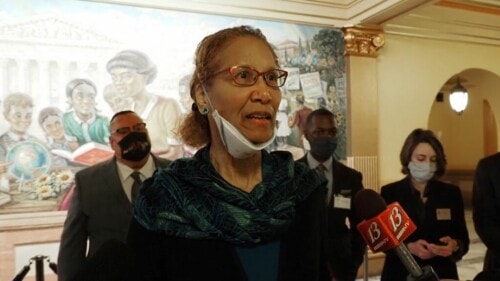Kansas Supreme Court Affirms Constitutionality of Congressional Redistricting Map Wyandotte County Judge Previously Ruled Map Unconstitutional
Published May 18th, 2022 at 11:12 AM
Above image credit: The Kansas Supreme Court issued a ruling Wednesday in the appeal of district court ruling that a new U.S. House redistricting map was unconstitutional. (Courtesy | Kansas Reflector screen capture from Kansas Supreme Court website)TOPEKA, Kansas — The Kansas Supreme Court issued a ruling Wednesday declaring the congressional redistricting map approved by the Republican-led Legislature to be in compliance with the Kansas Constitution.
The justices conducted oral argument Monday on an appeal by Attorney General Derek Schmidt of a Wyandotte County District Court judge’s May 18 opinion the map transferring Lawrence from the 2nd District to the 1st District and splitting Wyandotte County between the 2nd and 3rd districts was unconstitutional.
Justice Caleb Stegall, in a two-page ruling, said the majority of the state’s highest court held Senate Bill 355 didn’t violate the state constitution.
“Therefore, the judgment of the district court is reversed and the permanent injunction ordered by the district court is lifted,” Stegall said in the order.
Stegall, an appointee of Republican Gov. Sam Brownback, also said a “full opinion describing the facts, rationale and holdings of the court is forthcoming, along with all dissenting or concurring opinions of members of the court.”
The state Supreme Court acted in the consolidated case filed by 20 plaintiffs in three separate lawsuits challenging the congressional map’s constitutionality on grounds lawmakers engaged in partisan gerrymandering and intentionally weakened the influence of minority voters.
The defendants were Secretary of State Scott Schwab and the top election officials in Wyandotte and Douglas counties.
Lenexa Sen. Dinah Sykes, who serves as the Senate’s Democratic leader, said the Supreme Court’s decision was disappointing, but she respected the court’s position in the unprecedented case. This was the first time a Kansas district court judge found a congressional redistricting map to violate the constitution.
“But make no mistake: This process did not serve the Kansans we are elected to represent. Kansas Republicans disrespected, ignored and gaslit engaged voters from the very start,” Sykes said. “While that isn’t unconstitutional, it is unacceptable. Kansans should continue to hold legislative leadership to task for their consistent refusal to accept that, despite their best efforts, our residents are not a monolith and have a different vision for our state from the GOP’s.”
The Kansas Legislature recast the state’s four congressional districts based on results of the 2020 U.S. Census. The map is redrawn every 10 years to reflect changes in population.
One objective of Republicans in the Legislature was to undermine reelection prospects of U.S. Rep. Sharice Davids, a Democrat in the 3rd District of Johnson and Wyandotte counties. The new map would take remove voters in the Democrat stronghold of Wyandotte County north of Interstate 70 into the 2nd District.
Addition of liberal-leaning voters to the 1st and 2nd districts were calculated to be insufficient to threaten reelection campaigns of U.S. Rep. Tracey Mann and U.S. Rep. Jake LaTurner, both Republicans.
Democratic Gov. Laura Kelly vetoed the congressional map, but two-thirds majorities in the state House and Senate voted to override her veto.
Kansas Solicitor General Brant Laue argued federal court was the appropriate jurisdiction for challenges of the state’s proposed U.S. House map. He said the Legislature did nothing contrary to the Kansas Constitution in deciding how to recast districts served by three Republicans and one Democrat.
Attorneys representing plaintiffs told justices the Legislature engaged in racial discrimination in violation of the state’s Bill of Rights and served to shake foundational ideas that political power was inherent in the people and government existed for equal protection of citizens.
“Racial voter dilution and partisan gerrymandering are antithetical to those core constitutional principles,” said Sharon Brett, an attorney with the American Civil Liberties Union of Kansas. “It classifies and favors one group of voters over another. It distorts and manipulates the map to advantage those in power.”
Tim Carpenter covers the Capitol for the Kansas Reflector, a nonprofit news operation covering Kansas state government and politics as part of States Newsroom. This story first appeared on the Reflector.





